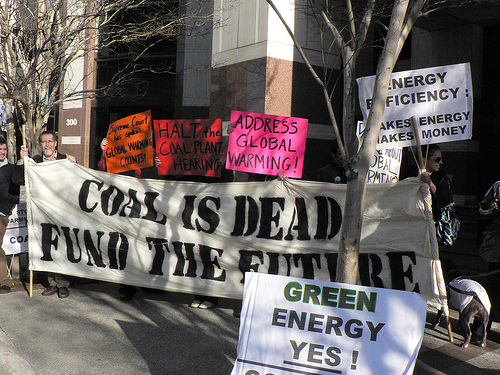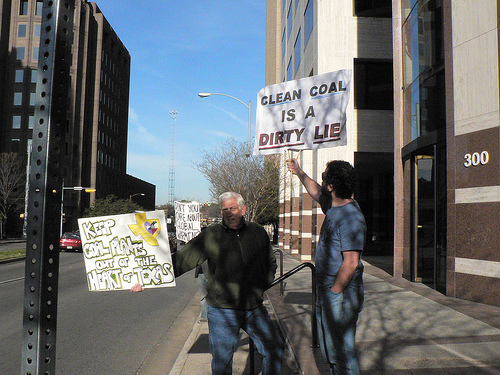 This week Public Citizen Texas and the Sierra Club are launching a statewide media tour of Texas coal plants.
This week Public Citizen Texas and the Sierra Club are launching a statewide media tour of Texas coal plants.
The Environmental Protection Agency (EPA) recently rejected key aspects of the air permitting plan of Texas’ regulatory agency — the Texas Commission on Environmental Quality (TCEQ) and called for proper enforcement of the Clean Air Act in Texas.
That’s why we’re launching a TEXAS STATE-WIDE COAL PLANT TOUR to visit communities that have been negatively impacted by the TCEQ’s failure to enforce the law and control pollution. We’ll be collecting postcards from citizens at the tour stops across Texas to deliver the messages to the EPA in support of the EPA’s recent announcement — and will have an action center here on the blog so that you can get involved as well.
If you live in Waco, Dallas, Abilene, College Station, Corpus Christi, Bay City, or Houston, keep an eye out for our clean energy trailer! You’ll find us in the following locations at these times:
Week One Tour Stops
Monday, Sept. 21, WACO, 10:00 am, Heritage Park, 3rd Street & Austin Avenue
Tuesday, Sept. 22 , DALLAS, 10:00 am, The 500 Block of Reunion Blvd East, across the street from the Dallas Morning News (32.774975,-96.807328 on google maps)
Wednesday, Sept. 23, ABILENE, 10:00 am, Lake Fort Phantom Hill, Sweetwater, Texas
Week Two Tour Stops
Monday, Sept. 28, COLLEGE STATION, 10:00 am, Location TBA
Tuesday, Sept. 29, CORPUS CHRISTI, 10:00 am, Location TBA
Tuesday, Sept. 29, BAY CITY, 4:00 pm, Steps of the Court House (1700 7th Street)
Wednesday, Sept. 30, HOUSTON, 10:00 am, Tranquility Park, 515 Rusk, across from the federal courthouse
To learn more about proposed and existing coal plants in Texas and the negative impacts that they bring to our state, check out The Threat from Coal is Far From Over.
 NEWSFLASH! Carbon Dioxide emissions may represent a threat to public health or welfare.
NEWSFLASH! Carbon Dioxide emissions may represent a threat to public health or welfare. In the early 1970s, when it looked like the passage of the federal Clean Air Act was inevitable, power companies in Texas went on a building boom to construct 12 dirty, old-technology power plants before legislation went into effect. It was more than 30 years before the Texas Legislature addressed pollution from these “grandfathered” plants. Today, just as Congress and the Obama administration are poised to pass a series of tougher air pollution laws and cap global warming gasses, a dozen applications for additional coal fired power plants in Texas have been permitted or are pending. If built, this dirty dozen of coal plants would add an astounding 77 million tons a year of global warming gases to our already overheated air, 55,000 tons of acid rain forming gases, 29,000 tons of ozone forming chemicals and 3,800 lbs of brain damaging mercury. Your call to your state senator this week can help stop another generation of coal plants from being built.
In the early 1970s, when it looked like the passage of the federal Clean Air Act was inevitable, power companies in Texas went on a building boom to construct 12 dirty, old-technology power plants before legislation went into effect. It was more than 30 years before the Texas Legislature addressed pollution from these “grandfathered” plants. Today, just as Congress and the Obama administration are poised to pass a series of tougher air pollution laws and cap global warming gasses, a dozen applications for additional coal fired power plants in Texas have been permitted or are pending. If built, this dirty dozen of coal plants would add an astounding 77 million tons a year of global warming gases to our already overheated air, 55,000 tons of acid rain forming gases, 29,000 tons of ozone forming chemicals and 3,800 lbs of brain damaging mercury. Your call to your state senator this week can help stop another generation of coal plants from being built. Last Friday two administrative law judges refused to hear testimony on the impact of carbon dioxide emissions during the permitting process for the NRG Limestone coal-fired power plant. The contested case hearing for NRG’s air quality permit application will be going on all week long, but testimony on the proposed plant’s contribution to global warming will not be allowed. The judges decided that the TCEQ has adopted clear policies that they would not consider testimony on the issue, even though the Supreme Court ruled in 2007 (
Last Friday two administrative law judges refused to hear testimony on the impact of carbon dioxide emissions during the permitting process for the NRG Limestone coal-fired power plant. The contested case hearing for NRG’s air quality permit application will be going on all week long, but testimony on the proposed plant’s contribution to global warming will not be allowed. The judges decided that the TCEQ has adopted clear policies that they would not consider testimony on the issue, even though the Supreme Court ruled in 2007 ( In protest, local environmentalists gathered for an 8:30 a.m. protest Monday Feb 22 outside the State Office of Administrative Hearings. Groups supporting the protest included: Public Citizen, SEED Coalition, Environment Texas, Clean Water Action, Re- Energize Texas, and the Texas Climate Emergency Campaign.
In protest, local environmentalists gathered for an 8:30 a.m. protest Monday Feb 22 outside the State Office of Administrative Hearings. Groups supporting the protest included: Public Citizen, SEED Coalition, Environment Texas, Clean Water Action, Re- Energize Texas, and the Texas Climate Emergency Campaign.

